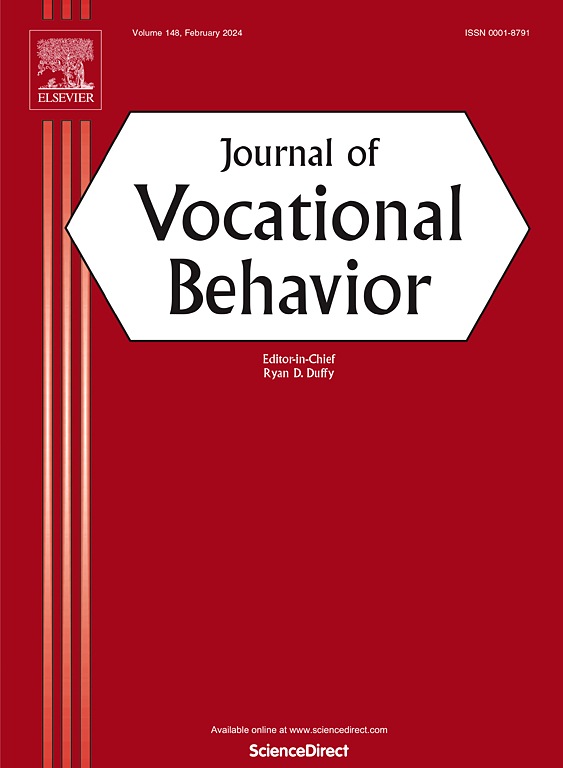堆砌砖块还是建造大教堂?情感转变如何影响对日常任务重要性的认识
IF 5.2
1区 心理学
Q1 PSYCHOLOGY, APPLIED
引用次数: 0
摘要
从工作中获得积极意义的最基本经验之一源自对任务重要性的认知。虽然与管理者和受益人的互动可以提供灵感线索,使员工的工作任务意义变得突出(格兰特,2012 年,2008 年),但仅仅依靠对这些离散经验的理解,可能会限制员工每天持续感知工作任务意义的能力。为了扩大对形成日常任务重要性感知的影响因素的理解,我们借鉴了人格系统互动理论(Kuhl,2000 年)来研究情感转变的影响。通过对 10 个工作日进行每日日记设计,我们对嵌套在 38 名员工中的 292 项每日观察结果表明,积极情绪的上移和消极情绪的下移与每日任务的重要性呈正相关。反过来,日常任务的重要性与帮助行为呈正相关,而与工作退缩呈负相关。日常任务的重要性还对随后工作日的起始情绪有间接影响。今天认为任务重要性高的员工更有可能在明天开始时因前一天较高的帮助行为而产生较低的消极情绪,因前一天较低的工作退缩而产生较低的积极情绪。这些结果为我们了解日常任务的重要性提供了新的视角,并对情感、任务重要性和工作绩效方面的理论和实践产生了重要影响。本文章由计算机程序翻译,如有差异,请以英文原文为准。
Stacking bricks or building a cathedral? How affective shifts shape perceptions of daily task significance
One of the most fundamental experiences of deriving positive meaning from work stems from perceptions of task significance. Although interactions with managers and beneficiaries can provide inspirational cues that make the significance of employees' work tasks salient (Grant, 2012, 2008), relying solely on an understanding of these discrete experiences may limit an employee's ability to consistently perceive the significance of work tasks from day to day. To expand understanding of the influences that shape perceptions of daily task significance, we draw on personality systems interaction theory (Kuhl, 2000) to examine the influence of affective shifts. Using a daily diary design over 10 workdays, results from 292 daily observations nested within 38 employees showed that upshifts in positive affect and downshifts in negative affect were positively related to daily task significance. In turn, daily task significance was positively related to helping behaviors and negatively related to work withdrawal. Daily task significance also exhibited an indirect effect on the subsequent workday's start-of-day mood. Employees who perceived high significance today were more likely to start tomorrow off with lower negative mood due to higher helping behaviors the day before and with lower positive mood due to lower work withdrawal the day before. The results yield new insights into the experience of daily task significance and offer significant implications for theory and practice on affect, task significance, and work performance.
求助全文
通过发布文献求助,成功后即可免费获取论文全文。
去求助
来源期刊

Journal of Vocational Behavior
PSYCHOLOGY, APPLIED-
CiteScore
13.10
自引率
5.40%
发文量
85
期刊介绍:
The Journal of Vocational Behavior publishes original empirical and theoretical articles offering unique insights into the realms of career choice, career development, and work adjustment across the lifespan. These contributions are not only valuable for academic exploration but also find applications in counseling and career development programs across diverse sectors such as colleges, universities, business, industry, government, and the military.
The primary focus of the journal centers on individual decision-making regarding work and careers, prioritizing investigations into personal career choices rather than organizational or employer-level variables. Example topics encompass a broad range, from initial career choices (e.g., choice of major, initial work or organization selection, organizational attraction) to the development of a career, work transitions, work-family management, and attitudes within the workplace (such as work commitment, multiple role management, and turnover).
 求助内容:
求助内容: 应助结果提醒方式:
应助结果提醒方式:


